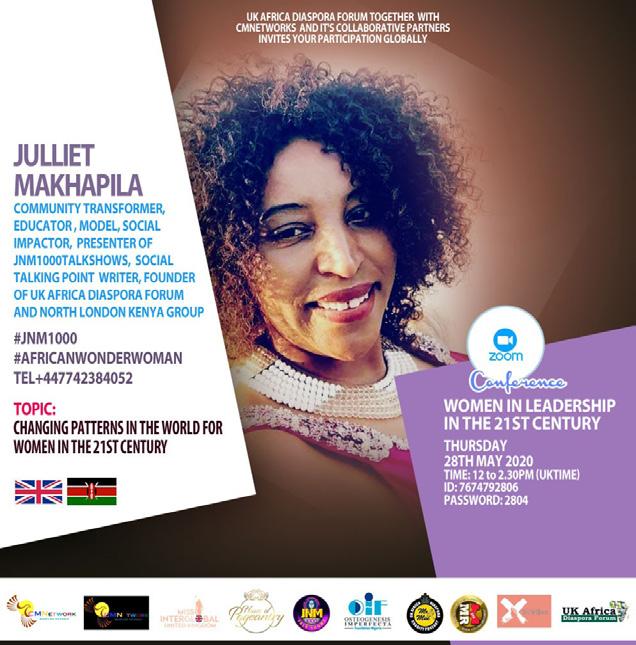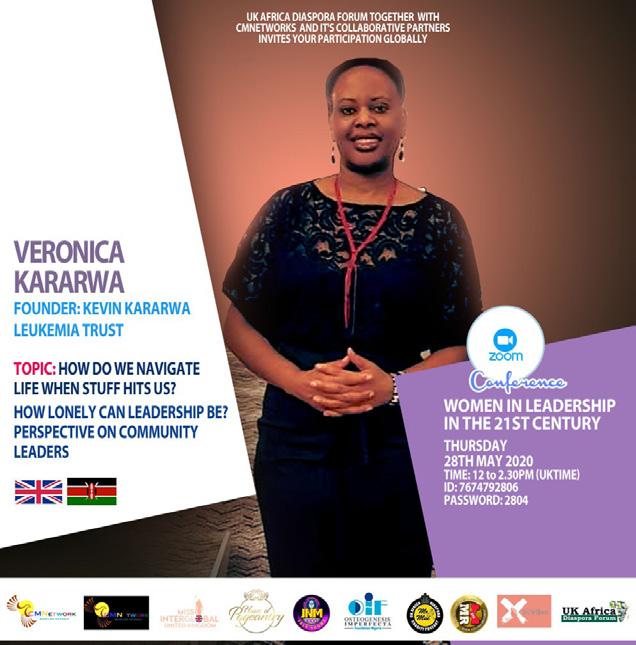
7 minute read
Save Lives Stay Home
SAVE LIVES STAY HOME By Juanita Lwanga
There’s already a lot of information out there and it mainly seems a matter of harnessing and bringing it together in one place where its accessible by the target audience. There is a need however to break it down, without losing the factual health points on what should be vital (and reasonably expected especially in terms of rights etc since it’s also the same key workers from the similar background who will be imposed with this added pressures) that we need to find a balance.
Advertisement




WOMEN LEADERSHIP IN THE 21ST CENTURY THROUGH COVID-19






DO YOU THINK YOU HAVE COVID 19? Joanita Mirembe Lwanga Community Health Activist
The Institute for Fiscal Studies (IFS) said a higher When you need medical treatment it can be worrying proportion of people from ethnic minority backgrounds and exhausting. If you are not feeling at your best you live in areas hit harder by Covid-19. may not feel like complaining, or making suggestions However, they tend to be younger on average, so should be less vulnerable. about how your care could be improved. And perhaps you feel that the doctors and nurses 'know best' and don't want to challenge them or ask them questions, But the report found various black, Asian and minority especially at a time like this. ethnic groups were experiencing higher per capita deaths. However, anyone receiving medical treatment can expect to be treated with professionalism, courtesy And after accounting for differences in age, sex and and respect by all the staff with whom they come into geography, the study estimated that the death rate for contact - not just the doctors and nurses. people of black African heritage was 3.5 times higher than for white Britons. And you should always feel that you can ask questions about what is happening to you, make suggestions DO YOU HAVE? about the care you receive, and choose what treatment a high temperature – this means you feel hot to touch you receive and how you receive it. on your chest or back (you do not need to measure (Patient First) your temperature) The NHS should: a new, continuous cough – this means coughing a lot for more than an hour, or 3 or more coughing episodes in 24 hours (if you usually have a cough, it may be worse than usual) • • • • ask you if you agree to treatment, give you information about treatment choices, treat you with care and skill, keep your personal information confidential, These are the main symptoms of coronavirus. • let you see your health records, and The 111 online coronavirus service will ask about your symptoms and tell you what to do. • • respect your human rights. NHS staff should follow codes of practice and guidance. Get Tested! • If you think that the NHS has not acted properly, you can complain. We all know a number of Black and minority ethnic workers are in key worker positions and continue to uphold the economy through their vital jobs during • You can take legal action against the NHS if they break the law Useful information - Rights! this crisis. It is important therefore that you take care of yourselves and loved one's around you, by knowing What are my rights when I use the NHS? your covid19 status. The NHS always has to respect your legal rights. Did you know as a key worker, you are entitled to Consent getting tested for coronavirus? You can refuse treatment, even life saving treatment. Apply for a test to check if you have coronavirus This is the case even if other people disagree with your • If you have symptoms of coronavirus, you can apply for a test if you: decision. But there are exceptions. Your doctor can treat you even if you don’t want it if: • • • are an essential worker (such as people who work for the NHS or emergency services) are aged 65 or over cannot work from home (such as construction you are in hospital under the Mental Health Act 1983, or you cannot make decisions because you ‘lack capacity’. Information workers or delivery drivers) Your doctor should give you clear information about risks, • live with an essential worker, someone aged 65 side effects and any other relevant information about your or over, or someone who cannot work from home treatment. This is to make sure you have all the information Get your voice heard if you receive unfair treatment! you need to make decisions about your treatment.
Access to treatment
You have the right to use NHS services if they can help you. The services cannot refuse to help you without a good reason. If the waiting times for a service are too long you may be told about different places you can get the same or similar treatment.
Standard of care
Health professionals must use reasonable care and skill when they treat you. This means different things in different situations. Your doctor should follow trusted medical opinion and not do something that other doctors wouldn’t do. You should always get care and treatment that is appropriate for you and your needs. Your health professionals should also think about your preferences.
You have a right to be cared for in somewhere safe, clean and suitable. You should be given suitable food and drink to keep you well while you are there.
Confidentiality
Health professionals must not tell other people about your diagnosis, condition, treatment or other personal information. They can only tell other people if: • you tell them they can, • they need to in an emergency, or • a court orders them to.
Medical records
You have the right to see your medical records. Your medical records must be up-to-date, accurate and relevant. It is possible to have some mistakes corrected in your records, although medical opinions are usually not removed.
Human rights
NHS services must respect your human rights. For example, they have to respect your private and family life.
Discrimination
You have the right to use NHS services without being unlawfully discriminated against on the grounds of disability or other characteristics. This protection is under the Equality Act 2010.
Complaints
You also have a right to complain about any NHS service if you are unhappy. The NHS must acknowledge your complaint and investigate it properly.
About PALS
The Patient Advice and Liaison Service, known as PALS, has been introduced to ensure that the NHS listens to patients, their relatives, carers and friends, and answers their questions and resolves their concerns as quickly as possible.
PALS also helps the NHS to improve services by listening to what matters to patients and their loved ones and making changes, when appropriate.TrustBerkshire Healthcare NHS Foundation Trust Lastly, if you have any further concerns, Rianna Croxford BBC Community affairs journalist is currently leading ground breaking investigative journalism in unfair health treatment and services for ethnic minorities for both patients and key workers. Please (responsibly) contact her directly via email: rianna. croxford@bbc.co.uk or riannacroxford@protonmail. com to ensure your views and experiences make it to the right platforms, so change, real change occurs.
Be the Change you want to see in this World. Mahatma Gandhi
Sources:

https://bit.ly/2WV4BIE https://bit.ly/2XpgsxB https://bbc.in/3goC5qy https://bit.ly/2A4y0qU
AT HOME SHOULDN’T MEAN AT RISK OF DOMESTIC ABUSE #YOUARENOTALONE

If you are controlled or physically, sexually, economically or emotionally abused by a partner, ex-partner or family member, this is domestic abuse. Household isolation rules do not apply.
Police and support services remain available.
If you are in immediate danger, or suspect someone else is, call 999.
If you are unable to talk, call 999, listen to the operator and then either press 55 on a mobile, when prompted, or wait on a landline to be connected to the police, who will be able to help.
If you’re worried you, or someone you know, may be experiencing domestic abuse:
The Freephone 24-hour National Domestic Abuse Helpline run by Refuge offers support for women: 0808 2000 247 The free Respect Men’s Advice Line offers support for men: 0808 801 0327
Galop’s free National LGBTQ+ Domestic Abuse Helpline offers support for LGBTQ+ people: 0800 999 5428
The free Respect Phoneline offers support for men and women who are harming their partners and families: 0808 802 4040
The free NSPCC helpline offers support for anyone worried about a child: 0808 800 5000






